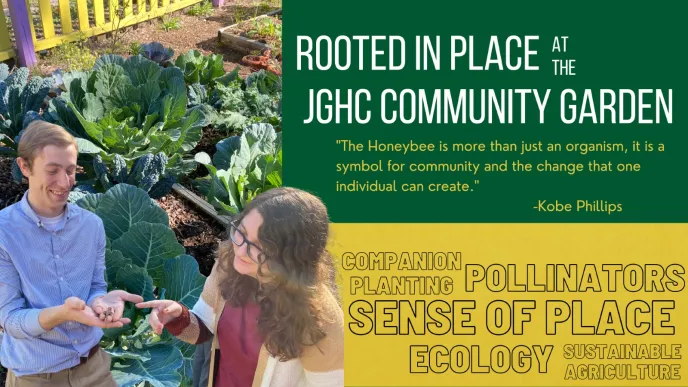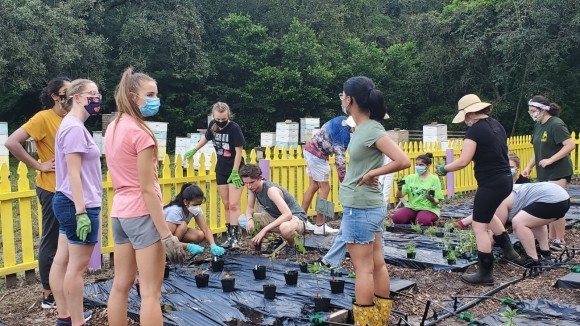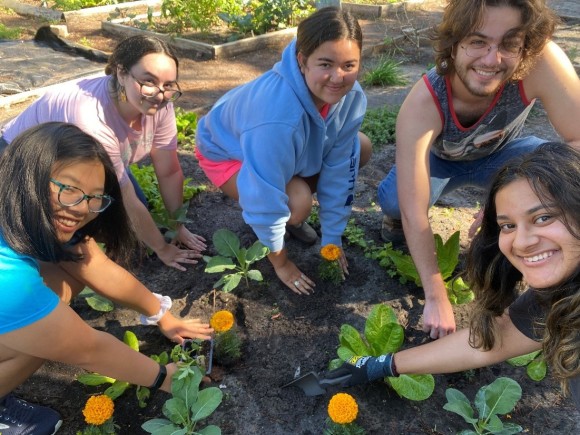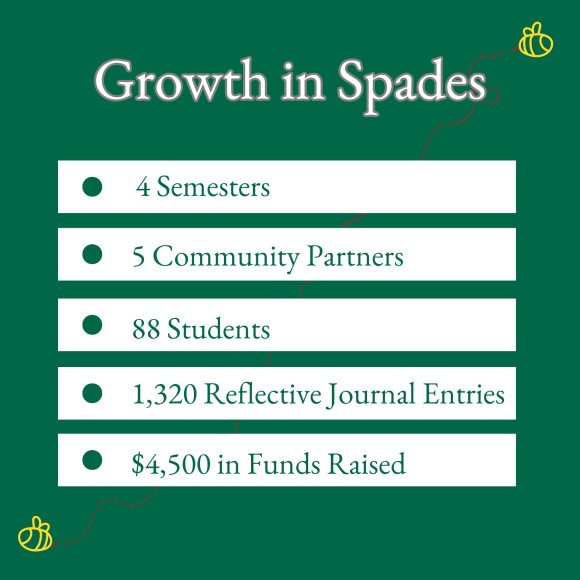Rooted in Place: A Classroom Reimagined

Flyer created to advertise the Rooted in Place course to Judy Genshaft Honors College students. Image courtesy of Kobe Phillips.
Specular Reflection
By Jules Heitman, Rooted in Place student
Maybe we’ll spend our whole lives
Looking through steel and glass
For the kind of love
That comes from what grows
But just maybe
The love that grows
Surrounded by polished metal and shiny glass
Is refracted outward to those
Who wander concrete forests
Just like sunlight
Looking for a plant
To help grow
Rooted in Place
Tucked away in the university’s botanical gardens, next to the buzz of traffic on the gray asphalt of Bruce B. Downs Boulevard, lies the Judy Genshaft Honors College (JGHC) community garden. The garden boasts of a different buzz: of bees, and a group of eager students. They squat in the dirt braiding sweetgrass, their faces warmed by the Florida sun as they form tactile connections with the plants interlaced in their fingers. The air smells of damp soil and marigolds. In this setting, they unearth how agriculture, ecology, and human flourishing entwine. A new classroom is born.
At the University of South Florida, the undergraduate course Rooted in Place is an attempt to break away from the monotones and monochromes of the modern classroom to a space as fecund as our students’ minds. Rooted in Place is open to all students from any discipline in the JGHC and is taught by undergraduate student instructors Kobe Phillips and Audra Nikolajski and overseen by honors faculty. The course will continue to be taught by student instructors in the future, with the hope that each student instructor will add their own colors and flavor to core topics and thus the course will grow in varieties much like blossoms in a garden.
Ecology—nowadays predominantly considered a science—derives its meaning from the Greek word oikos, standing for house, habitation, or clan. Synchronization between members of a house is ecology’s heart and soul. As the honors college prides itself in building community, Rooted in Place was founded on the philosophy that building a sense of place also builds community.

The First Seeds: From Metaphors to Action
The COVID-19 pandemic stressed unprecedented needs for community-building on college campuses. Before Rooted in Place was created as a course, a handful of students shared informal lessons and volunteered at the USF Botanical Garden. But the growing weeds in rundown plots threatened their ambitions of taming the land for cultivation. Then, in August of 2021, we reimagined the garden as a classroom, where students could learn from the soil rather than the white board.
In developing the Rooted in Place course, we drew on constructivist learning theory. Active learning promotes dialogue between teachers and students and helps assimilate new knowledge while challenging preconceived ideas. We wanted our fellow students to absorb how ecology impacts agriculture, mitigates food deserts, and promotes food sovereignty. We wanted students to learn through the tactile connections developed from growing a garden. In the process, they dig into their own cultural roots and explore individual identities and values as an exercise in narrative empathy. We wanted them to capture their ensuing reflections. Here, we briefly highlight our course modules.
Module 1: Eco-Community
In the footsteps of Robin Wall Kimmerer, author of Braiding Sweetgrass: Indigenous Wisdom, Scientific Knowledge, and the Teachings of Plants, we draw on indigenous wisdom of engendering harmony between persons and nature to illuminate that the land we care for in turn takes care of us. In the chapter “Epiphany in the Beans,” Kimmerer retells her story of finding purpose in her garden, exemplifying the connections developed between a person and a location. We cultivate these connections by literally playing in the dirt, allowing the students to feel the soil at their fingertips with the intention to evoke a sense of belonging and incite connections to preserving the land, thus connecting Kimmerer’s experience with their own. Alongside Kimmerer we also teach from The Ten Principles of Civic Ecology by Marianne E. Krasny, through which students learn the history of notable environmental projects that began with just hope and a sense of place and eventually led to beautifully crafted spaces. Hence, the students see a direct parallel with their work in the garden, and how with time, they can see themselves as ecological stewards.
Finally, “Play for Keeps” explores how advocacy in contemporary political landscapes has helped to preserve community spaces through the stories of trials and triumphs of community gardens in St. Petersburg, Florida and in New York City. Students learn about food sovereignty and community ecology’s potential to curb food deserts.
Module 2: People, Culture, and Food
This module connects lessons in Medicinal Botany to growing herbs that improve wellbeing. The history of the Gurung people of Nepal, who cultivated Mad Honey, enriches our lessons on symbiosis between people, land, and vital organisms, such as pollinators. In a lesson on companion planting, we spotlight symbiosis via cooperation using the marigold as an exemplar sentinel plant that deters pests from neighboring lettuces, while anchoring nitrogen to the soil. The lesson demonstrates how specific plants can lead to healthier gardens without synthetic fertilizers.

Module 3: Sustainability and the Future
This module brings our class to the present-day biosphere in the Anthropocene, where urbanization is challenging sustainable human-nature symbiosis on a rapidly warming planet.
Module 4: Reconnecting with Our Roots
This module teaches students to cook with ingredients they grew. At the culmination of Rooted in Place, students reflect on their experience and pen eco-poetry, like “Specular Reflection,” presented above.

Bearing Fruit
Since 2021, more than 88 students have taken this course over four semesters. Via a partnership with The Well, a food security and community wellness center at USF, students harvest herbs to make medicinal teas, connecting agriculture, production, and wellness in ways that maintain the course’s kinesthetic focus. At the end of the semester, surplus vegetables are harvested and stored for all USF students to access through a partnership with the university’s Feed-A-Bull food pantry. Students also prepare meals with their harvest. Other community partners include the Wilcox Nursery, the USF Botanical Gardens which provided the space for the class to meet, and a USF Greek Life chapter of Delta Tau Delta, which donated the fence demarcating our classroom. As the JGHC Living Learning Community and other community donors invest in our garden through our fundraising efforts, we are able to take on additional plants and projects in the garden to expand opportunities to our students, and save for a greenhouse.
The course instructors, who are UN Millennium Fellows, promote Sustainable Development Goals for a more desirable tomorrow. The UN Millennium Fellowship is a subset of the United Nations Academic Impact and MCN (More-Care-Now) Foundation. It is a semester-long, campus-based leadership development program. Fellows work to promote UN Sustainable Development Goals (UN SDGs) on campus and in communities around the university. Kobe Phillips proposed his project on UN SDG-11: Sustainable Cities and Communities and UN SDG-2: Zero Hunger, while co-instructor Audra Nikolasjki proposed hers on UN SDG-4: Quality Education, though Rooted in Place also touches on Sustainable Development Goals 3 (Good Health and Well-Being) and 15 (Life on Land). The JGHC provides opportunities for students to be partners in instruction. Rooted in Place became the living laboratory for Kobe and Audra’s UN Millennium Projects.
The Seeds We’ve Planted
As humans migrate to urban spaces on a warming planet, stewardship of tomorrow’s living spaces demands that young minds engage with today’s realities in ways that promote rewilding as a matter of sustainability and justice. We hold that embodied learning of subjects otherwise relegated to technical texts is an effective approach to engage future change makers who may become scientists, storytellers, or artists. Rooted in Place is a course, but it is equally a metaphor that sticks.
--
Kobe Phillips is a rising senior at the University of South Florida studying Ecology & Evolutionary Biology. As the founder and instructor of the JGHC Community Garden and a local beekeeper, he is passionate about pollinators and ecological stewardship. As a UN Millenium Fellow, Kobe will continue his work in building sustainable communities for both people and wildlife as he pursues further graduate studies in the Built Environment.
Audra Nikolajski is a rising senior at the University of South Florida majoring in English and Political Science and minoring in Education. Dedicated to storytelling and its role in education, she devotes her time to mentoring, writing, teaching, and community-building. As a UN Millenium Fellow and Phi Beta Kappa Key into Public Service Scholar, Audra will continue her work in curriculum development and educational advocacy as she pursues an MPP in Educational Policy.
Sayandeb Basu, MPhil, PhD is currently faculty director of the Office of National Scholars at the University of South Florida. In past life, he was faculty of Physics and the Honors Program at the University of the Pacific in Stockton, California, where he taught both physics and classes on creativity and human values, and social uses of knowledge. He studied physics and philosophy at the University of Cambridge.